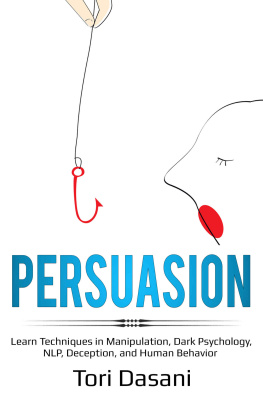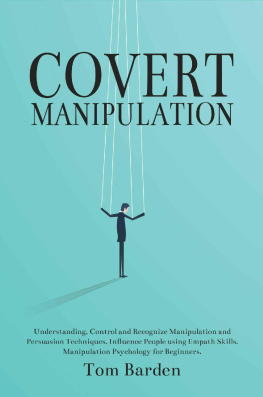It of primary importance to establish a clear definition of manipulation for the purposes of this book. Without understanding exactly what constitutes manipulation, there will be a great deal of difficulty in separating instances of manipulation and other forms of influence.
While you probably have your own idea of what counts as manipulation, it is important that you adopt the books definition, in order to make sense of the practical advice in later chapters.
Basic Ideas
In a broad sense, manipulation is the effort to affect the behavior or perception of others. Most definitions extend that to include via the use of abusive, deceptive or otherwise exploitative means or something similar, as a means of differentiating between manipulation and other influencing behaviors, such as persuasion.
That raises even more questions, such as what constitutes exploitative. Deception is relatively easy to define as a willful concealment or alteration of the truth. But does deception really preclude persuasion?
At a job interview, you probably wont mention the times you came in late to work at your previous job due to hangovers; is that manipulation? You could argue that anyone hiring for a job is already operating on the understanding that people are likely to highlight their positive traits, and draw attention away from the negatives. In that sense, it isnt necessarily dishonest to omit certain information in that situation. So expectation can also play a part in determining the ethics of manipulation and where the line is drawn between manipulation and other forms of influence.
Putting ethics aside for now, there is another word, in that broad definition, worthy of attention. Defining manipulation as an effort suggests that manipulation is still manipulation regardless of success or failure the act of manipulation is defined as the attempt . Ironically, those least successful at manipulating others, who are most frequently discovered, are more likely to gain a reputation as manipulative than those who succeed.
You can probably point to someone in your orbit, a relative or co-worker perhaps, who you consider to be manipulative. Yet, consider how others view them. Are they well known as a manipulator? Does this impact their success? The answer to this, too, may be complicated. If someone is considered by their peers at work to be manipulative and yet holds sway over the boss, they might still be judged successful. When thinking about manipulating others, its important to define clear goals. This will allow you to make rational, objective decisions, which is key to success.
At this point, there are too many questions and too few answers. The remainder of this chapter will tie up some loose ends, and establish a definition that will give bearing for the rest of the book.
Manipulation Vs Influence
The modern world has adopted the term influencer for people with a large social media following, capable of influencing others with their content. It doesnt take a particularly critical mind to recognize the source of this term as advertising. As consumer behavior evolves, advertisers have taken note and increasingly look to harness the power of influencers to gain attention for products. This is done variously through paid or unpaid sponsorships, promotional deals and agreements.
In some cases, influencers disclose these agreements while, in others, they dont. Ethical questions are again raised, particularly if an influencer is ostensibly just a happy consumer but secretly on the payroll of the company which sells the product.
Surely this whole moral quandary could have been avoided, if advertisers instead coined the term manipulator ! Yet its hardly surprising that they didnt. What this highlights is that, although people expect advertisers to be manipulative, it is still unthinkable that they would admit to it. Instagram stars happily list themselves as influencer on their profile page with seemingly no negative connotations.
But the goals of many influencers , especially those who work with advertisers, are fundamentally manipulative. Its not even a grey-area issue. Influencers aim to shift products to their followers in order to make money. It is not possible to know if everyone they influence would benefit from the product, nor is it possible to know their financial situation or any specific circumstances. In this case, the influencer is putting their own interests first.
Manipulation does not necessarily include an attempt to harm others. However, it must, to some degree, place ones own goals and interests first. This is part of the puzzle.
Additionally, it is safest and most logical to refer to influence as a parent term of manipulation; one which includes manipulation and other methods of influence, such as inspiration and emulation.
Manipulation Vs Persuasion
These terms might seem diametrically opposed, with persuasion acting as the honest form of manipulation, where the actor is up front about their goals and opinions. However, for the purposes of this book, it will be more useful to consider persuasion as a tier below manipulation.










